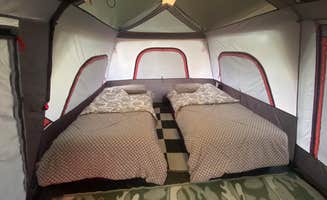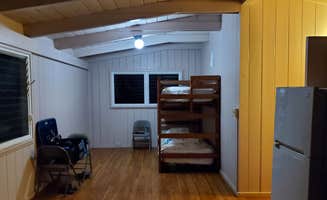Camp Olowalu provides oceanfront accommodations just 6 miles south of Lahaina on Maui's west coast. Seasonal visitors can observe whales from December through April directly from the shoreline. The campground sits along Highway 30, which creates noticeable road noise during daytime hours that can affect the camping experience, especially for light sleepers.
What to do
Kayaking and paddleboarding: Rent equipment directly from Camp Olowalu for affordable rates to explore the coastline. "Can take relatively affordable kayaking tours from the campgrounds or rent SUP/kayaks for very affordable rates," notes one visitor who appreciated the convenience of onsite water sports.
Coastal hiking: The trail at Waiʻanapanapa State Park Campground offers rugged terrain and ocean views. "The trail winds along the coastline high above the water, allowing amazing views of the lava structures, arches, tubes, coves and caves that the sea has shaped. The trail is strenuous and footing can be tricky in places," according to a camper who recommended allowing extra time for the experience.
Stargazing: Limited light pollution creates optimal conditions for night sky viewing. "Little light pollution, great for star gazing," reports a Tentalow guest who found the evening skies particularly memorable during their stay.
What campers like
Outdoor showers: Camp Olowalu features distinctive outdoor shower facilities that receive consistent praise. One camper called them "works of art" while another mentioned, "The outdoor showers at Camp Olowalu resort are worth the stay in and of themselves."
Quieter mornings and evenings: Before daily visitors arrive at Waiʻanapanapa State Park, overnight campers enjoy relative solitude. "Campers can come and go and feel like you have the place all to yourself at sunrise just before the early permit holders arrive," writes one reviewer who appreciated the private early morning beach access.
Camp amenities: Practical conveniences make extended stays more comfortable. "Free coffee in the morning!" notes a camper, while another appreciated the "large sinks to wash your pots and pans" and cell phone charging stations that help maintain connections while camping.
What you should know
Wildlife awareness: Prepare for early wake-up calls from local roosters. "Between 12am and 5am were the only hours that things seemed to die down... Then, about 5am, the feral roosters chime in to have their say," explains one camper. Another warns, "Don't turn your back on the chickens. They'll get into your vehicle if given the chance."
Temperature considerations: Waiʻanapanapa State Park Campground cabins lack air conditioning. "No AC, so we just slept with the windows open and it was comfortable," reports a visitor who stayed in February, though summer temperatures may differ.
Wind exposure: The open layout at Camp Olowalu provides minimal wind protection. "Absolutely no shade at all on any sites, save for one campsite (campsite #1). Beware the wind!!! Because it's open air with no shielding trees, sooo many people evacuated to sleep in cars or resigned to/woke up to collapsed tents," cautions a camper who experienced high winds during their stay.
Tips for camping with families
Bug preparation: Insect protection is essential for comfortable glamping near Lahaina, Hawaii. "I would highly recommend bringing bug spray and lots of water," advises a family who stayed in the Mountain View Tentalows.
Beach safety: Ocean conditions at Pālāʻau State Park Campground vary seasonally and require caution. "The views here are amazing and Molokai is a very uninhabited island, so this place is very peaceful," notes a visitor, though families should monitor ocean conditions, especially during winter months when surf can be dangerous.
Tent site selection: When tent camping, position matters for convenience. "Our first time here we tent camped. Some of the sites seemed close together but we stayed at the end and had good privacy with the trade off of a long trip to the bathrooms," explains a camper who found the arrangement worked for their family needs.
Tips from RVers
Limited electricity: RVers should plan for self-sufficient power needs when glamping near Lahaina. "We had a problem charging up our electronics and assumed that we might find electricity at the state park just like back on the mainland — we were wrong. There wasn't an outlet to be found... So bring your solar panels!" recommends one RVer.
Parking layout: The campground van area at Camp Olowalu resembles a parking lot rather than traditional campsites. "While there was plenty of room and a nice picnic table, but it was exactly like camping on the perimeter of a large parking lot," explains an RVer who found the arrangement functional but not scenic.
Shower timing: Plan shower use strategically to avoid crowds. "If camping on Maui, definitely worth it for the last night of the trip for a good shower before flying home," suggests one RVer who appreciated the cleaning facilities before departure.



